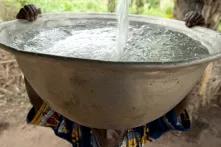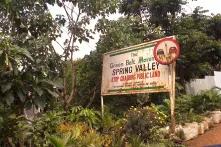By Gail Karlsson
The UN General Assembly has designated 2012 as the International Year of Universal Energy Access, and the UN system has undertaken a global initiative on Sustainable Energy for All by 2030, led by the UN Foundation. In launching this initiative, UN Secretary-General Ban Ki-moon emphasized that “energy poverty is devastating to human development”. Questions of energy use and access – by whom, for whose benefit, and for what purposes – are also at the heart of the global discussions on sustainable development in connection with the Rio+20 conference and its follow-up processes.
Energy access is particularly important for women in developing countries, due to their traditional roles in collecting firewood, dung, crop wastes and other materials to burn as fuel. The large amounts of time and physical effort taken up with fuel-related activities are important factors in limiting women’s opportunities for education and employment, and contribute to persistently higher poverty levels for women. In addition, women suffer serious types of health damage from carrying heavy loads of firewood and cooking over smoky fires.
Research by ENERGIA found that biomass fuels (mostly collected by women) accounted for large percentages of the total energy consumed in many of the poor countries in Africa and Asia. But women’s unpaid work in collecting and managing biomass fuel supplies is not usually measured in national labour statistics or energy sector reports. ENERGIA and other organizations have worked to raise awareness about gender and energy issues among governments and energy sector institutions so that the impacts of women’s energy poverty are recognized and inequalities are not perpetuated.
Efforts to address women’s particular energy needs must often start with discussions about the different workloads and responsibilities of men and women. Briefings and training workshops can help government ministries and energy institutions move away from a posture of ‘gender neutrality’ by explaining the gender dimensions involved at all stages of decision-making processes (in national and international institutions as well as in households and communities).
Since the energy sector is male-dominated, targeted actions may be required to develop goals and objectives that address women’s particular energy needs. It is also particularly important to make efforts to actively involve women in the design, implementation and evaluation of energy policies and initiatives, taking advantage of their relevant experience and expertise, and also providing additional training and support where necessary.
Gender audits of government policies and programmes have in some cases led to the adoption of gender mainstreaming plans by government ministries, energy sector institutions and project managers to help establish formal, long-term commitments to gender equality in energy activities. Gender-specific needs assessments, data collection systems, and budget allocations are important tools for integrating gender balance into policy frameworks, investments, financing facilities, training programmes, staffing and support services.
In order to promote economic development for women, energy sector policies and projects need to focus not only on relieving women’s household burdens, but also on expanding women’s business activities through use of more energy-efficient processes and equipment. In addition to energy for basic household uses such as cooking, lighting, and water pumping, women also need improved energy technologies for their traditional informal production and marketing activities. Many of these businesses, like food processing, baking, brewing beer, and making soap and shea butter products, require large amounts of time and heat energy. More efficient types of equipment increase the profitability and productivity of these activities, and new communications technologies provide better market access and information.
Women can also become directly engaged in the new energy sector businesses, either individually or through group activities. Potential enterprises and entrepreneurial activities involve producing more efficient stoves, selling and installing solar home products, managing village-level power systems (including micro hydropower generators, wind turbines, and multifunctional platforms), constructing and marketing biogas digesters, or producing biodiesel fuels from locally grown crops.
For women to take advantage of these potential business opportunities, however, they may have to overcome a variety of social, economic and legal barriers. One substantial hurdle is that throughout the world technology, construction, and engineering jobs are generally viewed as ‘men’s work’. For women to make a transition from collecting firewood and making dung cakes to building, marketing and installing alternative energy technologies, they not only need technical training, business skills and credit facilities, but also require relief from gender discrimination and stereotypes that limit women’s roles.
Ultimately, activities focused on increasing women’s access to energy are only one aspect of a much larger movement towards building economies based on social justice and environmental conservation. In connection with the outcomes of the Rio+20 Conference, and implementation of the Sustainable Energy for All initiative, it is important for advocates to work with like-minded partners to ensure that there is coordinated and systematic representation of women’s needs and concerns within the overall context of promoting gender equality and sustainable development.
Click here for the pdf version of From Collecting Fire Wood to Installing Solar Home Systems (3 pages, pdf, 462KB)
--------------------------
Gail Karlsson is a Senior Policy Advisor for ENERGIA International Network on Gender and Sustainable Energy, launched in 1995 by committed individuals and organizations working on gender mainstreaming in energy policy and practice. ENERGIA is hosted by the ETC Foundation and connects over 8,000 development practitioners across the world, with an active presence in 22 countries in Africa and Asia.

